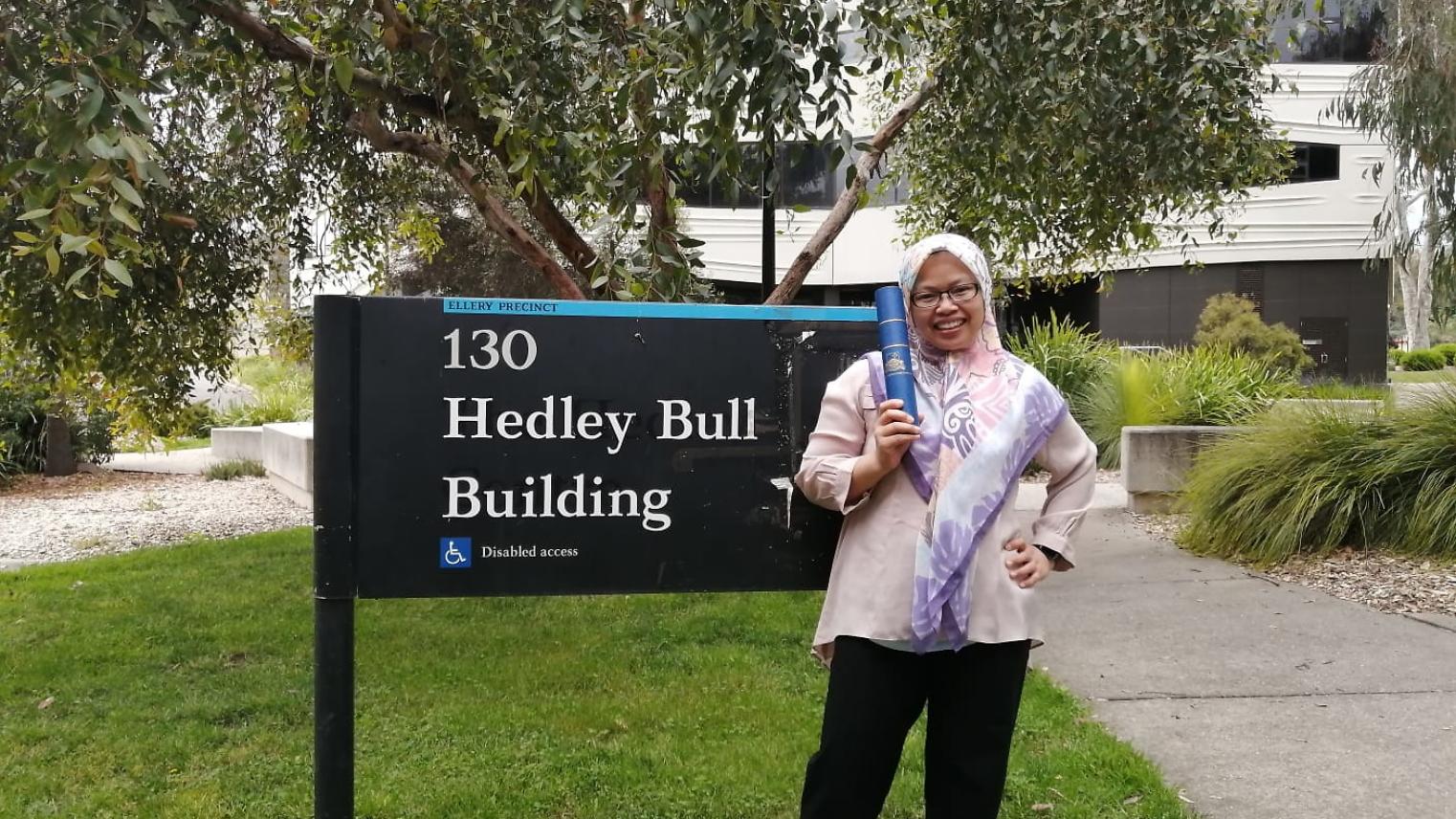Meet Haula Noor

Haula Noor is a PhD graduate of the Department of Political and Social Change at the Coral Bell School of Asia-Pacific Affairs. She received her BA in Psychology and a MA in Interdisciplinary Islamic Studies, both from the State Islamic University Syarif Hidayatullah in Indonesia. More recently, she obtained her doctoral degree for the research project titled ‘The Family Context and Its Role in Making Jihadists: The Case of Jihadist Families in Indonesia’.
Having interviewed more than 30 jihadists’ families in Indonesia, Haula tells us about her experience as a PhD candidate at the Bell School.
What are some of your aspirations?
One of my aspirations is to share my experiences as a PhD student and a mum, with other female fellows studying in Indonesia. Although many Indonesian women now pursue their studies and obtain PhDs, this is not the case for women from Muslim-Betawi backgrounds like myself. Women, especially in my village, do not always have an opportunity to pursue higher education due to socio-cultural barriers. Betawi is one of the ethnicities in Indonesia that has been stereotyped as “orang pinggiran”, or ‘peripheral people’ who are seen as uneducated and culturally inferior. Luckily, I have a father who wanted to break this stereotype by exposing all my siblings and me to the world of education. He was an elementary teacher in a small rural school but had a big dream to send all his children to pursue higher education. He, himself, just finished his undergraduate degree after all his children had completed university. One day he told me that “I could not inherit you with wealth and money but I can give you education”. So, here I am, the only woman in the history of my extended family to get a scholarship for my education and obtain a PhD degree abroad.
Why a PhD and why the Bell School or the Department of Political and Social Change?
Pursuing a PhD degree allows philosophical understanding through conducting research. For me, research is the activity that cultivates thought-provoking ideas whilst systematically supporting all teaching and learning activities. Notably, at the higher education level, a good lecturer means a good researcher. So, studying a PhD upgrades not only your academic career but also your personal development. I think this is important if you want to have a career in academia.
I came from a non-political science background and was aware of the high reputation of my supervisor, Associate Professor Greg Fealy, which made me brave enough to pursue my dream to be a PhD student at The Australian National University. I knew that I would learn from the best scholars interested in Indonesia, like Professor Virginia Hooker, Professor Edward Aspinall, Associate Professor Marcus Mietzner, and my supervisor.
What kind of experiences and opportunities did you have at the Bell School and how have they helped you achieve your aspirations and career goals?
Growing up, I always assumed that a good achievement in obtaining knowledge was exemplified by good grades and how well you passed exams. But my time at ANU, and particularly at the Bell School, has taught me that experiencing — and surviving — the journey of obtaining knowledge itself is the real achievement. Receiving critiques from world-leading academics, bright students, experienced researchers, and engaging professors has taught me that we can gain knowledge from everything and everyone around us. Experience is always the best teacher. This experience has helped me grow as an academic and to further my career in academia.
What are you currently working on?
Continuing my thesis on jihadists’ families in Indonesia, I am currently working with my fellow researchers on terrorism to create a module on rehabilitation for women and children convicted of terrorism-related charges, which involves family members as the rehabilitator. There are approximately 39 women charged under the terrorism bill. Not to mention children who are the victims of the involvement of their parents in terrorism. Gender sensitivity is missing from the current rehabilitation. Many women are mothers, and some are young. They have different needs that should be acknowledged as part of their rehabilitation process. The situation of these women is also characterised by the diversity and complexity of individual cases. Oversimplification of women in this context should be avoided.
What are your plans now that you have finished your PhD?
Returning to my home country has been my wish since the beginning of my study. So, as I have my PhD testamur, it is time for me to return to Indonesia to share my experience and knowledge.
What piece of advice would you give to those who are thinking about studying Political Science?
Studying politics does not mean you will be a politician. The purpose of studying this science is to deepen your knowledge and understanding of the political forces that shape the interaction between people, communities and institutions. So go for it! As long as it involves people and communities, you can always understand them by integrating political science with other disciplines that match your background.